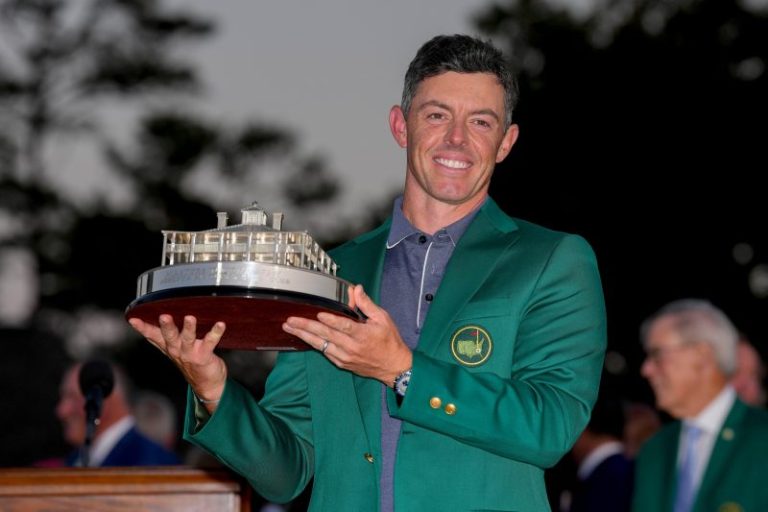As exhausting and frustrating and ultimately validating as the last decade was for Rory McIlroy, the next and final phase of his career might turn out to be the most interesting.
Above all else, when McIlroy dropped to his knees and unloaded years of emotion onto the 18th green at Augusta National last month, what he earned was a lifetime of mental freedom. For the first time since he was a teenager first coming out on the PGA Tour, there is no longer a single result or tournament that will dramatically change his place in history or, more importantly, his day-to-day happiness and well-being.
“I’ve achieved everything I’ve wanted to do in the game,” he said at a news conference Wednesday before the PGA Championship begins in Charlotte, North Carolina. “I dreamed as a child of becoming the best player in the world and winning all the majors. I’ve done that. So everything beyond this forever, for however long I decide to play the game competitively, is a bonus.”
It’s an undeniably massive turning point in his career; maybe even his life. And it comes at an interesting time: Having just turned 36 at the beginning of May, we can reasonably project that McIlroy has about 10 years left, give or take, to put the finishing touches on his all-time resume.
For a career Grand Slam champion, and now definitively the best player of the post-Tiger Woods generation, the compiler phase of his career is going to ask a question that none of us – McIlroy included – can yet answer.
What happens when someone like McIlroy has this much of his prime remaining with no white whale left to chase?
Maybe unburdening himself from the psychological grip of the Masters unlocks another level of greatness he didn’t know existed. Or perhaps when he gets in the heat of battle from here on out, not having that desperation to end what had been a 10-year major drought works against his ability to focus the same way under pressure.
It’s impossible to predict, especially because we’re dealing with somebody who just isn’t wired the same way most great champions are.
“Everyone needs to have goals and dreams, and I’ve been able to do something I dreamed of for a long time,” McIlroy said. “I’m still going to set myself goals, I’m still going to try to achieve certain things. But I sit here knowing that (the Masters) very well could be the highlight of my career. That’s a very cool thing. I want to still create a lot of other highlights and high points, but I’m not sure if any other win will live up to what happened a few weeks ago.”
That perspective, that obvious nod to human nature, is what makes McIlroy our most relatable superstar and why so many people – even those who don’t follow golf closely – were so emotionally invested in seeing him complete the long-awaited Masters conquest.
But realistically, we all know Woods never talked that way in the prime of his career. Rafael Nadal didn’t talk that way. LeBron James doesn’t talk that way. You couldn’t even imagine it because they were competitive maniacs who found it very easy to disassociate the momentary satisfaction of winning a title from the unending grind that was necessary to keep winning them.
The truth is, if McIlroy were like that, he’d already have 10 majors by now and would spend the last part of his career trying to chase down Woods and Jack Nicklaus. That’s not who he is, which isn’t meant to suggest McIlroy is lacking competitive instincts or that he’s going to put his work ethic into cruise control.
He’s just a little more normal and, as we’ve seen so many times, quite a bit more vulnerable.
“I feel like I sort of burdened myself with the career Grand Slam stuff, and I want to enjoy this,” he said. “I want to enjoy what I’ve achieved and the last decade of my career and don’t want to burden myself by numbers or statistics. I just want to try to play the best golf I can.”
It’s a wonderful sentiment and probably what most of us would say if we were in the same situation. But from a competitive standpoint, it’s destined to age poorly for someone who plans to be at the highest level for the next 10 years.
In 2009, when Roger Federer finally won the French Open to complete his career Grand Slam in tennis, it felt a little bit like McIlroy’s Masters. A few weeks later, he won his 15th Grand Slam at Wimbledon, setting a new all-time record.
Not long after that, as Federer’s dominance of the game ended, retirement speculation bubbled up. But just when people thought he was completely finished, the footsteps of Nadal and Novak Djokovic motivated Federer to make some equipment and technical changes that spurred three more Slam titles in 2017 and 2018.
Point being, McIlroy’s singular achievement in this era is enough – for now, and maybe forever. But 10 years of golf is a very long time. If McIlroy is going to compile the way his talent demands he should during this stretch of his career, it’s unlikely to be inspired by reliving Sunday at Augusta over and over again.
What ultimately motivates McIlroy to push past that and reach for the next big thing is as unknowable as anyone’s future. But it has to emerge at some point, or else the idea he’s already experienced the highlight of his career will become a self-fulfilling prophecy.

